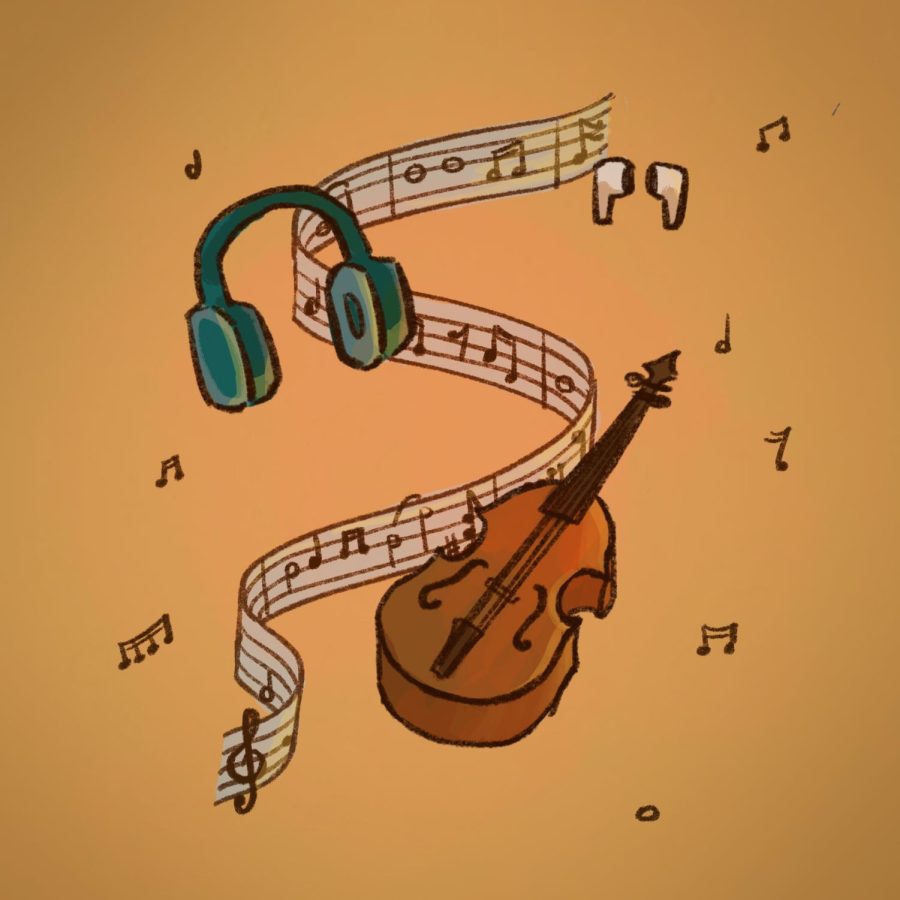Could Your Music Be Making You Smarter?
November 10, 2022
In this day and age, music is so readily accessible to everyone that as long as they have a device that connects to the internet anyone can listen to music almost anytime they want. This is especially apparent with teens as Headphones Addict states 82 percent of teenagers listen to music daily. Many students listen to music while they are at school, but there is discussion about music having a negative impact on their learning.
Texas A&M University says that “when you are doing two things at the same time, like studying and listening to music, and one of the things requires cognitive effort, there will be a cost to how much information you can retain doing both activities.” They also say that “in basic terms of memory…we do a better job of recalling information in the same conditions in which we learn the material. So, when studying for an exam, it is best to mimic the exam conditions.” Naturally, when you have something that requires attention, even if it is only a small amount, it will pull you away from the task you are trying to concentrate on. It may also condition you to have music playing in the background, making it difficult to perform when it comes time for your exam. However, senior Miles Payzer says that he likes to listen to music during worktime and while doing homework because it helps him focus.
Does listening to music really help people focus or is it more of a distraction? The answer could depend on what types of music you are listening to. According to The Music Universe, the most popular music genres among teens are Pop, Hip-Hop/Rap, Rock, Country, and Jazz. Texas A&M University says that “in general, words are distracting … So, if you want to listen to music while you study, try to listen to something that does not have words, or if it does have words, hopefully, it will be in a language that you don’t understand at all, otherwise that’s going to distract from the stuff you’re trying to study.” None of the aforementioned music genres seem to fit these requirements except for jazz occasionally. However, sophomore Jennie Long says she likes “lofi music when I’m doing homework,” a genre known for not only lack of lyrics but also a very low volume, relaxing vibe that is good for studying. Even so, junior Ashwash Kallan says his music preference is “mostly rap.” Seemingly the opposite of the ideal studying music, yet he still uses music to concentrate. The same rings true for Payzer who also prefers rap, and freshman Emilie Provenzano who enjoys “pop music and romance music.” Texas A&M University also suggests “listening to familiar background music, because it is less distracting than something new or exciting.” Seemingly, as is the case with Provenzano, Payzer, and Kallan, it does not really matter what music students listen to, as long as it is a familiar sound that will draw their attention away from their work.
While it may be safe to say that the types of music people listen to does not heavily affect their studying and work efficiency, many people believe that certain types of music can have a positive effect on the development of children. The Mozart effect is a belief that children, and more commonly fetuses, who listen to music by classical period composer Wolfgang Amadeus Mozart will grow up to have superior cognitive function. It makes sense why the myth surfaced, as Mozart was a child prodigy himself, however, there is little scientific evidence to prove this theory. Britannica says that “the whole idea comes from a small study done in 1993, which found that college students who listened to Mozart’s Sonata for Two Pianos in D Major (K 448) showed modest improvement in a test of spatial reasoning.” This mostly inconclusive test would later be stretched out of proportion in a book, “The Mozart Effect: Tapping the Power of Music to Heal the Body, Strengthen the Mind, and Unlock the Creative Spirit” by Don Campbell. In the book he made incredible claims about the effects of Mozart and his ideas would be spread by the media. Britannica adds that “the original experiment with college students was reviewed in 1999, and the increase in the students’ spatial skills was found to be negligible. In 2007, the German Federal Ministry of Education and Research commissioned a team of experts to examine the scientific literature regarding Mozart and child development, and they found no reason to believe that it boosted intelligence.”
Mozart’s music clearly does not have any incredible brain boosting powers, but the question of how music can affect students in other ways must also be asked. There is often talk about how explicit music, especially rap, can have a negative effect on young adults. All the students who were interviewed had the same response. When asked if high schoolers should be allowed to listen to explicit music, they thought it should be allowed as long as they are wearing their headphones and are not disturbing anyone else. Psychology Today on the other hand, cites research that says boys and girls who were exposed to sexually explicit content in media and content that contained demeaning sexual comments were much likelier to experiment with sexual activity. Many boys and girls were also reported as interested in trying out sexual behaviors they saw in the media. Finally, boys and girls who were exposed to pornography and explicit content at a young age were more likely to sexually harass other students or be sexually abused.
While many students choose to listen to music during school, it is important to remember some of the negative effects it can have too. It should be regulated just like any other media, and students should be able to set their own limits on the type of music they listen to.



